#credit ratings
Photo

States with better credit ratings then the federal government
152 notes
·
View notes
Text

Creditworthiness therefore forms a central cog in the wheel of the financial system, having a bearing on issues such as credit extensions and borrowing costs. It is evaluated by credit reports and credit ratings that are issued by the credit rating agencies. For instance, credit rating agencies use these assessments to measure credit risk and financial stability of companies, governments, and agencies that issue bonds and shares. Financial experts and business coaches stress the following challenges and criticisms, emphasizing the need for accountability and transparency of credit rating agencies. It is possible to contribute to the development of improved credit sustainability with the help of this concept, which will make the decision-making process better for borrowers and lenders and therefore strengthen the financial system in general.
#creditworthiness#creditworthiness analysis#what is creditworthiness#increase your creditworthiness#finance#personal finance#credit rating#credit rating agencies#what is credit rating#credit rating meaning#credit ratings#needs of credit rating#moody's#standard & poor's#fitch#financial crisis#rating agencies#how to increase creditworthiness#importance of creditworthiness#creditworthiness meaning#creditworthiness of a company#credit score
0 notes
Text
This could also apply to schools 🏫
Just in case everyone needed a reminder of where we first saw this…😭
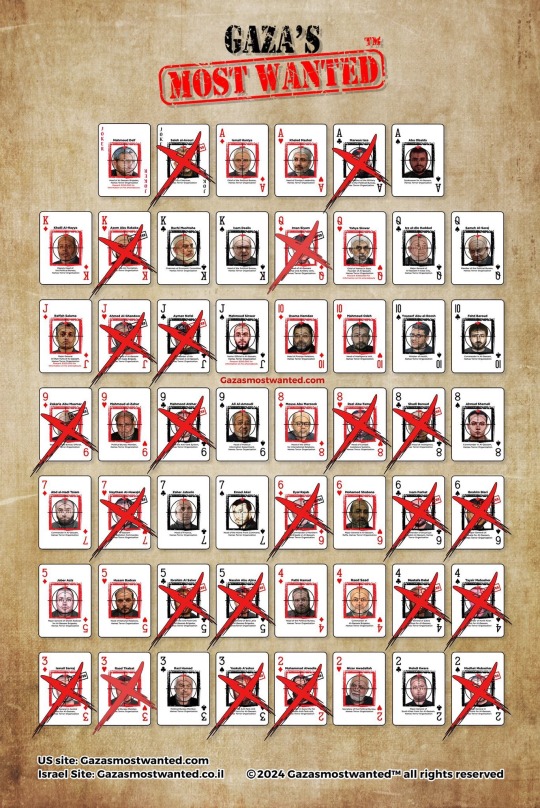

Next we saw the Egyptians
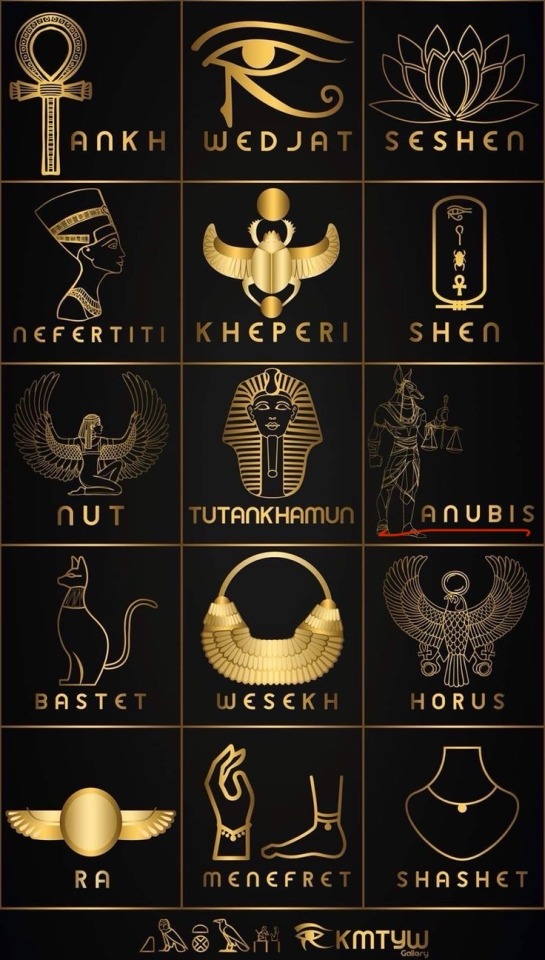
#finances#schools#initials A or B#blood 🆎#cities#target#magic carpets#Egyptians#death#target 🎯#credit ratings
0 notes
Text
Power of Credit Ratings
Discover the power of Egypt credit ratings with CRIF-dedicated solutions & services. As a prominent credit rating company, D&B focuses on delivering more than just credit scores — rather detailed credit reports, aiding investors in making informed decisions. Businesses and financial institutions leverage the plan for effective risk management, while the market relies on CRIF D&B ratings for a foundation of trust and confidence.

Navigate the financial landscape with assurance, as our assessments provide a thorough understanding of creditworthiness and contribute to a resilient market environment.
0 notes
Text
Philippines' credit ratings affirmed by S&P Global Ratings
The credit ratings of the Philippines for both long-term and short term were affirmed by the US-based S&P Global Ratings which also saw stronger economic growth for the country in the next few years, according to a Philippine News Agency (PNA) news article.
To put things in perspective, posted below is an excerpt from the PNA news article. Some parts in boldface…
United States-based S&P Global…

View On WordPress
#America#Asia#Blog#blogger#blogging#Bongbong Marcos#business#business confidence#business news#Carlo Carrasco#Corporate Recovery and Tax Incentives for Enterprises (CREATE)#CREATE Law#credit#credit ratings#economic dynamism#economic growth#economic recovery#economics#economy#Economy of the Philippines#Ferdinand Marcos#finance#geek#governance#gross domestic product (GDP)#jobs#Marcos#money#news#Philippine economy
0 notes
Text
Smart Home Mortgage Tips To Help You
TIP! Start preparing for getting a home mortgage early. If you are in the market for a mortgage, you should prepare your finances as soon as possible.
Buying a home is a lot of fun, but it can also be extremely stressful when waiting to find out if you were approved for a home mortgage. There are certain requirements you must meet, and the article that follows has the information you need. Keep…

View On WordPress
0 notes
Text
#Moody's#SVB#First Republic#banks#bad news#credit ratings#financial stability.#your spiritual journey
0 notes
Link
If you are a consultant and more precisely a traveling consultant, and you are wondering what type of credit cards are best suited for you, this article is for you.
#credit cards#credit score#credit ratings#low credit score#traveling consutants#credit cards for traveling consultants#best credit cards
0 notes
Text
I just remembered those commercials that said "Rated E for Everyone"
AO3 it's more like "Rated E for Everyone Better Take a Good Look at The Tags"
#archive of our own#ao3#fanfiction#rated e#e rated#that does not mean what you think it means#hope that never confused anyone#fanfic#credit to my sister for this one#thank you
3K notes
·
View notes
Text

#trump#donald trump#kamala harris#trump 2024#democrats#vote kamala#kamala 2024#kamala for president#vp kamala harris#republicans#mortgage#special interest#interest rates#housing#gas prices#economy#money management#money#budgeting#budget#food and beverages#foodporn#foodie#food#salary#paycheck#paypal#debt relief#debt#credit cards
249 notes
·
View notes
Text
Ticketmaster jacks us for billions so it can pocket millions
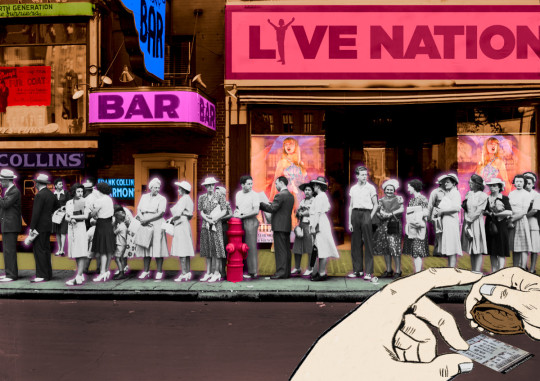
NEXT WEEKEND (June 7–9), I'm in AMHERST, NEW YORK to keynote the 25th Annual Media Ecology Association Convention and accept the Neil Postman Award for Career Achievement in Public Intellectual Activity.

Corruption is a system of concentrated gains and diffused costs: cheaters make a lot of money, and their victims each lose a little. The cheater has a much larger pool of money to spend on keeping the scam going, and the victims need to pay again to fight the cheater.
Actually, it's worse. The victim pays once when they are cheated, then, they pay a second time (in time and/or money) when they fight back against the cheater.
But in order to fight back effectively, the victims need to band together – it doesn't make sense for one victim to pony up to counter the cheater, because the cheater stole from a lot of people and can therefore spend far more than the victim lost and still come out ahead.
This is the third time the victim pays: they pay the "collective action" tax of locating other victims, agreeing to a common strategy for fighting back, and then coordinating with all those co-victims to keep the campaign up.
But actually, it's even worse. Because most corruption isn't just dishonest, it's incredibly wasteful. Corruption involves stealing ten dollars from you to make a dime for the cheater. The polluter who gives you cancer rather than cleaning up their industrial process costs you millions in medical bills – and maybe costs your family the lifelong trauma and expense of living with your death. They pocket an infinitesimal fraction of those costs. The rest is just wasted. They're setting your house on fire to spare themselves the cost of a match to light their cigar.
This is yet another way in which the deck is stacked in favor of corruption. A victim of corruption is placed in a condition of precarity and misery from which is it difficult to marshal a counteroffensive. The cheater, meanwhile, is made stronger and more comfortable by their corrupt activities. Immiserated victims must undertake the hard, ongoing work of acting together to be effective against the cheater. The cheater answers only to themself, avoiding the collective action costs that the victims pay every time they seek to act.
All of this is why we have governments. A government is (said to be) a democratically accountable way to meet the concentrated power of the corrupt with the concentrated power of the victims of corruption. Governments are many things, but they are especially a way of solving the collective action problem of enforcing the rules against cheaters. This is partially in service to justice – no one likes to be cheated, and a society of rampant and routine cheating is unstable and prone to collapse.
But it's also a matter of efficiency. While it makes a certain kind of selfish sense for the cheater to liquidate our dollar to make their penny, from a societal perspective, it's a catastrophe. Letting Wall Street slumlords corner regional markets in single family dwellings makes large amounts of money for their investors, but it costs those cities unimaginable amounts in public services as their housing stock decays, homelessness spikes, and schools and public services crumble for want of local taxes.
The paltry sums that Flint's creditors extracted by insisting on switching to a chlorinated water-supply that leeched lead out of the city's water infrastructure are crumbs compared to the vast, lifelong costs of giving an all the children in a city lead poisoning, to say nothing of the costs to the city as a city nor forever tainted by this unspeakably evil crime.
This is why inequality – and its handmaiden, monopoly – is so dangerous. The more concentrated private wealth becomes, the harder it is for the state to police, and the more likely it is that this private wealth will corrupt our officials. We see this all around us – for example, when Supreme Court justices receive lavish gifts from billionaires whom they later rule in favor of:
https://pluralistic.net/2023/04/06/clarence-thomas/#harlan-crow
Through the neoliberal era – the past forty years of billionaire-friendly Reaganomics – we've seen increasing concentration in wealth, coupled to increasing collusion between the wealthy and the government to protect the corrupt against the public. Think of the IRS's long decay, in which it turned a blind eye to increasingly blatant tax evasion by the ultra-wealthy, while training its fire on working people who fudge a few bucks on their returns:
https://pluralistic.net/2022/04/13/taxes-are-for-the-little-people/#leona-helmsley-2022
Likewise, think of the governmental obsession with "welfare cheats," no matter what the cost to families who are kicked off food stamps and Medicaid:
https://armandalegshow.com/episode/medicaid-enrollment/
All this in the midst of a corporate crime-wave that is not only unpunished, it's utterly unremarked-upon:
https://pluralistic.net/2021/12/07/solar-panel-for-a-sex-machine/#a-single-proposition
This emphasis on benefits cheating and indifference to corporate crime really highlights the drag that corruption places on a society's efficiency. Even if you believe that there's a lot of welfare fraud (there isn't!), the dollar in "undeserved" food stamps spent by a cheater costs society…a dollar. Meanwhile the dollar that a corporate criminal makes by skimping on workplace safety costs society thousands of dollars to care for the worker who is then maimed on the job.
This is very easy to see in the world of corporate environmental crime. The "social cost of carbon" measures the total cost of pollution: the injuries caused by marinating in fossil fuel extraction, processing and combustion byproducts; as well as the loss of life and property from climate events. These costs are blistering, so high that every MWh of renewable power we bring online saves us $100 in social carbon costs:
https://pluralistic.net/2024/05/30/posiwid/#social-cost-of-carbon
Governments that sleep on corporate crime are objectively governing badly. That's why the antitrust failures of every US presidential administration from Carter to Trump are so damning: they set the stage for later corruption that would not only be carried out on a larger scale than smaller firms could accomplish, but also for those large firms to corrupt the political process.
This is the Ticketmaster story. The superpredator that is today's Ticketmaster is the end-point of a series of ever-more corrupt mergers, waved through by every-more pliable presidential administrations. It was bad enough when Bush I allowed Ticketmaster to gobble up Ticketron in 1990. After all, the company had already proven itself to be a cesspit of corrupt, bullying activity.
The Ticketron acquisition kicked off a two-decade-long corporate crime-spree that produced a mountain of evidence proving Ticketmaster's nature as an inherently corrupt enterprise that acquired power for the purpose of abusing that power, at the expense of creative workers, the public, and the owners of venues:
https://www.rollingstone.com/music/music-news/pearl-jam-taking-on-ticketmaster-67440/
Despite this, the Obama administration waved through an acquisition that was obviously far more dangerous that the Ticketron caper: the 2010 merger between Ticketmaster and the concert promoter Live Nation:
https://en.wikipedia.org/wiki/Live_Nation_Entertainment#History
After a decade and a half of vertical monopoly power – Ticketmaster/Live Nation controlling ticketing, promotion and venues – the company has grown from a dangerous octopus with its tentacles twined around the industry into a kraken that is strangling every kind of live event and everyone who earns a living from them. This has produced an ever-more obvious string of scandals, most notably the company's assault on Swifties:
https://pluralistic.net/2022/11/20/anything-that-cant-go-on-forever-will-eventually-stop/
A combination of mounting public outrage (with Swifties at the vanguard) and the Biden administration's generational enthusiasm for smashing corporate power has led, at last, to a reckoning with the Ticketmaster kraken:
https://pluralistic.net/2024/04/30/nix-fix-the-tix/#something-must-be-done-there-we-did-something
Ticketmaster is a famously opaque organization. When Rebecca Giblin and I were working on Chokepoint Capitalism, our book on monopoly and creative labor markets, we were able to speak on the record to insiders from every part of the industry, except live performance:
https://chokepointcapitalism.com/
As soon as we raised Ticketmaster/Live Nation with club owners and other events industry insiders, they'd go pale and quiet and tell us that they didn't feel comfortable staying on the record. TM/LN has a well-deserved mafia-style reputation for savage retaliation against snitches.
With the DOJ Antitrust Division chasing Ticketmaster through the courts, we're starting to get a rare, on-the-record glimpse of TM/LN's operations, as its internal documents find their pay into court records. In response Ticketmaster's spokesliars have embarked on an epic spin campaign, to "contextualize" these damning numbers and paint the company as a weak, low-margin business that has been unfairly set-upon by the bullies at the DOJ.
In his BIG newsletter, Matt Stoller offers a spectacular, must-read breakdown of these documents and the ensuing spin:
https://www.thebignewsletter.com/p/is-ticketmaster-telling-the-truth
Stoller starts with Ticketmaster's insistence that it is barely profitable. Though this is true on paper, the numbers just don't add up. For one thing, anyone who's bought a ticket can see, printed on its face, TM's junk fees: "a 'service fee' without any obvious service [and] a 'convenience fee' that is anything but convenient."
Far more damning is a comparison between the price of a Ticketmaster ticket in the US vs the EU. The EU has legally mandated competitive ticketing, and the tickets there are far cheaper. A US ticket to see Taylor Swift will run you $2,600 – the same ticket costs $340 in the EU. As Stoller writes:
An American could fly to Paris, spend a few nights at a nice hotel, see a Taylor Swift concert, and fly back, for less than it costs to see that same show in the U.S.
How to make sense of this contradiction? How can Ticketmaster show such a low profit margin on its books but somehow end up costing event-goers such an absurd premium?
Start with the fact that Ticketmaster has three businesses, not just one. They sell tickets, but they also promote concerts (that is, front the money for personnel, travel and marketing), and they also own a bunch of the largest and most profitable venues in the country.
This allows them to play a shell-game that's very similar to (and possibly not actually different from) money-laundering, where money is shuffled between entities in order to shield it from creditors, suppliers or tax agents:
https://www.thebignewsletter.com/p/explosive-new-documents-unearthed
But this presents a problem for Ticketmaster. They're a publicly traded company and their investors demand high returns. And unlike performers or venue owners, investors have power over Ticketmaster management. Keeping "margin per ticket" number as low as possible lets Ticketmaster minimize the revenue it has to share with the people who actually do the work and invest the capital in live performances. But for investors, they need to show another number, one that's as high as possible, to keep the investors happy.
That number is "Adjusted Operating Income" or AOI. While gross margins are the difference between the face value of a ticket and the sum remitted to the venue and the performer, AOI factors in all the other revenue TM/LN books from that ticket, like kickbacks. TM/LN's AOI is very healthy: it's 37% on tickets and 61% on promotions.
Those sums delight TM/LN's investors, and they express their joy through lavish executive compensation packages. CEO Michael Rapino is America's fifth-highest paid CEO, at $139m/year (that's eight times the Fortune 500 average). His sidekick Joe Berchtold is America's highest paid CFO, at $54m. The total AOI for TM/LN is $732m/year – and 19% of that is being paid to two of its execs.
But LN/TM has a third line of business: operating venues. The AOI for these venues is just 1.7%. If this were a normal, cutthroat business, you'd expect those same return-focused investors to insist on their handsomely compensated execs selling off that low-margin turkey. But nevertheless, TM/LN keeps those venues on its books.
When those execs talk to the public, they use the poor profit margins of ticketing and the poor AOI on venues to plead poverty: "how can we be a monopoly when we're barely scraping by?"
But when they talk to the investors who decide whether to pay them 800% of the S&P500 average, they are more forthcoming.
Keeping the margins low on tickets – and making up the money with kickbacks and other corrupt payments – means that potential rival ticketing firms can't afford to get into the business. Without the venue and promotion business, those rivals wouldn't be able to command kickbacks. They'd have to subsist on the rock-bottom margins that are competitive with Ticketmaster.
Likewise those venues: ownership of key venues lets Ticketmaster/Live Nation force out credible rivals in important markets, and keep new ones from emerging, because again, they'd have to make a living on that paltry 1.7% AOI (or the even lower profit margins!).
As Joe Berchtold, the highest-paid CFO in America, told an analyst:
I don't think Concerts AOI per fan is a logical way to look at it. I think if you look at how we've talked about our business, we've talked about our business across the multiple pieces. So you have to look at it, what's the concerts plus sponsorship plus ticketing AOI per fan.
Berchtold is paid roughly $26,000/hour. Those words take roughly 25 seconds to utter, so that's a $7.20 explanation, but it contains a wealth of information – it's basically the DoJ's case in a nutshell.
But Stoller points out a curious fact that isn't captured here. Remember when I told you that TM/LN's NOI is $732m/year? What I didn't mention is the company's gross revenue: $16.7 billion.
When TM/LN talks about how shitty their business is, and therefore they can't be a monopoly, this is the trump card. How could a company creaming off a mere $732 million off $16.7 billion in gross revenue be a monopolist with "pricing power"?
This is where understanding corruption helps clarify our understanding and cut through the bullshit. Corruption is vastly wasteful. In order to extract $732m from $16.7b, TM/LN has to engage in a lot of wasteful and corrupt activities. They have to bribe other key players in the system, spend vast fortunes on lobbying, and generally do a lot of unproductive things with their money.
This is concentrated gains and diffuse losses. In order to command the highest salary of any American CFO, Berchtold has to cook up and maintain this process. In order to earn his $139m/year, Rapino has to play mafia don and keep everyone is his supply chain sufficiently terrorized or sufficiently greased to maintain omerta.
These two men take home a fifth of Ticketmaster's net income because they possess a rare and valuable skill. They are able to obfuscate a corrupt arrangement, enrobing it in layers of performative complexity, until the average musician, concertgoer, or lawmaker, can't understand it. Any attempt to unravel it will induce a deadly, soporific confusion. The investment industry term for his is MEGO (My Eyes Glaze Over), the weaponization of complexity. A skilled MEGO artist can convince you that the pile of shit they're peddling is so large that there must be a pony under it somewhere.
Here's Stoller, de-MEGOfying the TM/LN story:
Live Nation has a giant capital intensive unprofitable division of putting on concerts, from which it skims for its real cash flow. But this leverage among different subsidiaries means that it has an incentive to push up the cost of concerts overall, not just for its own profit. This incentive operates in two different ways. One, since ticket fees are based on the price of a ticket, Live Nation seeks higher prices for tickets so it can move more cash to its Ticketmaster subsidiary. And two, since Live Nation itself gets rebates by overpaying for venues, it has the incentive to push up the cost of shows. No one can undercut Live Nation, as it’s a monopoly.
You might think that this is a lot of mental energy to expend on understanding live performances. If you're not trying to see Taylor Swift, does any of this matter?
It assuredly does. Understanding how Ticketmaster's shell-game works is critical to understanding the similar shell-games played by many other kinds of monopolists, who have wrapped their tentacles around all the other parts of our lives. As David Dayen and Lindsay Owens write for The American Prospect, the companies that avoided monopoly prosecution by ripping off suppliers have bled those suppliers dry, and now they're coming for their customers:
https://prospect.org/economy/2024-06-03-age-of-recoupment/
From groceries to plane tickets, rent to cab rides, Amazon to Ticketmaster, we are living through the "Age of Recoupment," when the long con of lowering prices to secure monopolies flips enters it final stage: greedflating the shit out of customers, and using the monopolist's power over regulators to avoid consequences.
Today, everywhere consumers turn, whether they are shopping for groceries at the local Kroger or for plane tickets online, they are being gouged. Landlords are quietly utilizing new software to band together and raise rents. Uber has been accused of raising the price of rides when a customer’s phone battery is drained. Ticketmaster layers on additional fees as you move through the process of securing seats to your favorite artist’s upcoming show. Amazon’s secret pricing algorithm, code-named “Project Nessie,” was designed to identify products where it could raise prices, on the expectation that competitors would follow suit. Companies are forcing you into monthly subscriptions for a tube of toothpaste. Banks have crept up the price of credit, so customers who cannot afford price-gouging in their everyday transactions get a second round of price-gouging when they put purchases on credit. Expedia is using demographic and purchase history data to set hotel pricing for an audience of one: you.
When these companies end up in front of angry attorneys general, DOJ lawyers, or an FTC investigation, they'll use the Ticketmaster/Live Nation playbook to try and wriggle off the hook. They'll point to some barely-profitable (or money-losing) part of their business and say, "How could a monopolist possibly be running a business this shitty?"
If the DOJ makes its case against Ticketmaster, it will set a precedent, both in court and in policy circles, for understanding how a monopolist's corruption works. Monopolists aren't always businesses with gigantic margins. Like other criminals, their corruption can produce spectacular wealth and spectacular waste at the same time.

If you'd like an essay-formatted version of this post to read or share, here's a link to it on pluralistic.net, my surveillance-free, ad-free, tracker-free blog:
https://pluralistic.net/2024/06/03/aoi-aoi-oh/#concentrated-gains-vast-diffused-losses
#pluralistic#Michael Rapino#matt stoller#monopoly#antitrust#trustbusting#monopolism#poormouthing#credit mobilier#corruption#kickbacks#shell game#financial engineering#flywheels#live nation#ticketmaster#take rate#Joe Berchtold#guillotine watch#aoi#accounting tricks#mego#adjusted operating income
220 notes
·
View notes
Photo

Countries by credit rating
Credit ratings help to assess the financial stability of entire nations
by genuine_impact
114 notes
·
View notes
Text
#creditworthiness#creditworthiness analysis#what is creditworthiness#increase your creditworthiness#finance#personal finance#credit rating#credit rating agencies#what is credit rating#credit rating meaning#credit ratings#needs of credit rating#moody's#standard & poor's#fitch#financial crisis#rating agencies#how to increase creditworthiness#importance of creditworthiness#creditworthiness meaning#creditworthiness of a company#credit score
0 notes
Text

Guys we finally have a winner in the eternal battle...

#greece#funny#shitpost#meme#the fact that even in a world list Athens and Thessaloniki are fighting it out with each other is hilarious#okay i mean technically heraklion has the same rating as athens but let's ignore this#that 0.01 deficit to Thessaloniki can start a civil war#also some credit to chania being also in the list#heraklion#athens#thessaloniki#chania#crete#attica#sterea hellas#central greece#macedonia#greek cuisine#mainland#greek islands
158 notes
·
View notes
Text
greatest line delivery ever
#to his vas credit‚ its a very stilted line of dialogue lol#almost done with the cartoon. its pretty okay. id rate it like 7-8/10#clawdeen wolf#frankie stein#monster high#its a solid kids show. the animation is super cute#dracula‚ frankie‚ and cleo are the best characters
269 notes
·
View notes
Text
so who had the government violating human rights law because they hate poor people on their 2023 tory bingo?
yeah so this piece by robert booth just got published in the guardian and it begins as such:
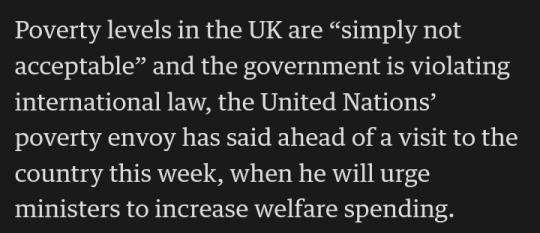
which is not at all surprising because yeah the government really hates poor people here. like as in one of the "solutions" to rising in homelessness in cities is to just,, buy unhoused people a one way train ticket to somewhere else.
its good to know that weve officially reached the level of violating international law. and by good, i dont know what i mean either.
anyway, booth goes on to say:
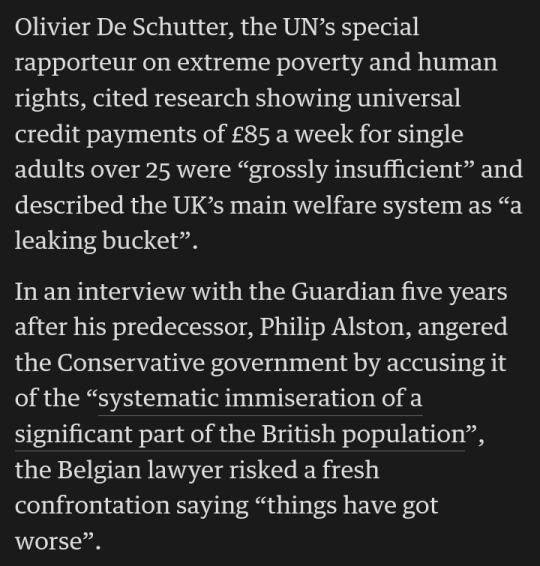

he is, of course, incredibly correct, and im highkey obsessed with him calling the welfare state "a leaking bucket".
obviously, the government gave a response of:
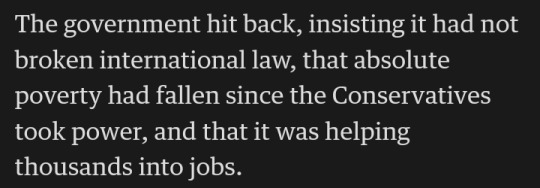
but did also go on to say this:

which doesnt really strengthen their argument. if anything, it actively hampers it.
it is also incredibly funny that the government's response to being accused of human rights violations due to the poverty in their country by the guy whose job involves being the go-to expert on human rights and poverty is akin to a child saying they didnt steal the chocolate that is staining their clothes and their hands and also they are still eating it.
please join me in pointing and laughing. at least, we have that.
de schutter actually offers solutions of his own within the article:

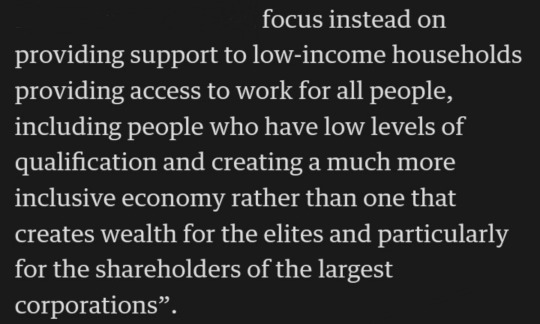
these, of course, famously being loved by tories. loved so much that they just forgot to do any of it during the last 13 years.
yeah, its been 13 fucking years.
if you dont use your vote to vote them out at the next general election, i will break your kneecaps with a rounders bat.
anyway, robert booth finishes the article off with:
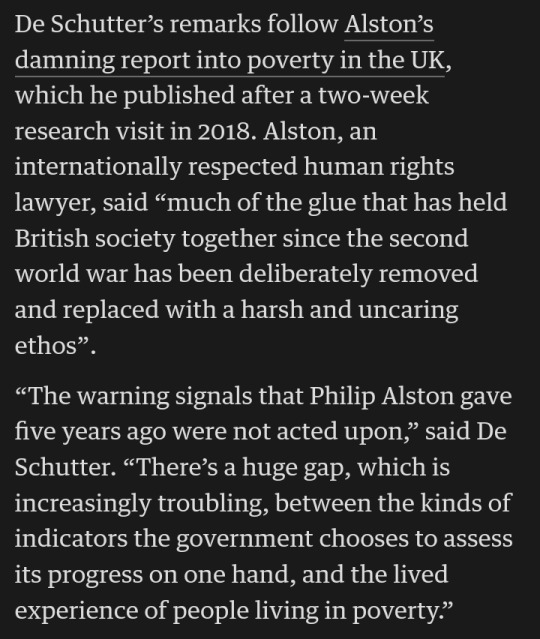
and wheres the fucking lie? it hits the nail on the head so accurately, its honestly as impressing as it is depressing.
obviously, this isnt the entire article and i would implore you to read all of it.
i dont exactly have my hopes up for the government actually doing anything to effectively address poverty, but hey, you never know.
#uk#uk politics#ukpol#britpol#british politics#tories#poverty rates#the un#fuck tories#robert booth#the guardian#olivier de schutter#philip alston#universal credit#conservatives#austerity#hell country#long post
94 notes
·
View notes